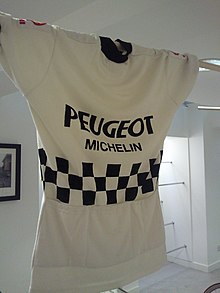Peugeot-Esso-Michelin
 |
|
| Team information | |
|---|---|
| Registered | France |
| Founded | 1901 |
| Disbanded | 1986 |
| Discipline | Road |
| Bicycles | Peugeot |
| Team name history | |
| 1901–1904 1905–1924 1925–1955 1956–1962 1963–1964 1965–1975 1976–1981 1982–1985 1986 |
Peugeot Peugeot–Wolber Peugeot–Dunlop Peugeot–BP–Dunlop Peugeot–BP–Englebert Peugeot–BP–Michelin Peugeot–Esso–Michelin Peugeot–Shell–Michelin Peugeot–Shell |
Peugeot team was a French professional cycling team that promoted and rode Peugeot racing bikes.
It is listed as the most successful cycling team of all time, on cyclingranking.com, with a large margin on the second placed team, Alcyon.
Peugeot cycles started producing bicycles in 1882, and from then on it was involved in sponsoring cyclists.
At the beginning of the century a Peugeot cycling team existed. Hippolyte Aucouturier rode Peugeot cycles when he won Paris–Roubaix and Bordeaux–Paris in 1903, and when he was disqualified from the 1904 Tour de France in which he had finished fourth overall, for the illegal use of trains and cars.
But the Peugeot team obtained success for the following four years in the Tour de France with Louis Trousselier, René Pottier and Lucien Petit-Breton. The Peugeot team finished second overall in the 1912 Giro d'Italia. The team would obtain two further victories in the Tour de France with Belgian Philippe Thys before the outbreak of the First World War.
Directly after the war, Peugeot cycles was one of the companies that made a consortium that pooled their resources into a collective cycling team called La Sportive. The objective of forming such a consortium was to keep the sport alive in the poor post-war economic situation.
After three years of the La Sportive consortium, Peugeot re-established its separate cycling team, and with Belgian Firmin Lambot won the 1922 Tour de France. During this time the team was known as the Peugeot team, or sometimes the name of a co-sponsor was added, which occasionally was Wolber, Alcyon, Dunlop, Tedeschi, Bianchi-Pirelli.
...
Wikipedia
